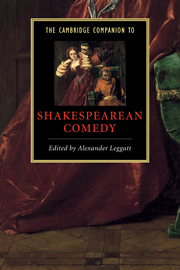Book contents
13 - The experiment of romance
from Part 2 - Shakespearean comedy
Published online by Cambridge University Press: 28 May 2006
Summary
Shakespeare's “romances,” the four plays written toward the close of his theatrical career, can be seen as his most experimental and, in some respects, his most daring theatrical ventures. They elude easy definition as comedy, tragedy, or history. Pericles, Cymbeline, The Winter's Tale, and The Tempest constitute in modern critical discourse a grouping of plays set off from the rest of his dramatic works. But what they share generically, and indeed what they are, may not be entirely self-evident. The first folio of 1623, which printed all of them but Pericles (added in the third folio of 1664), is no help. It placed The Tempest and The Winter's Tale among the comedies and Cymbeline among the tragedies. Clearly all are comedies in the formal sense in that they end not in death but in the happiness of reunions and/or promised marriages. Another generic term for them is “tragicomedy,” but this does not so much define them as simply describe the mixture of threatened tragedy and comic conclusion each contains. While historically the individual plays have been appreciated and performed – The Tempest in particular because of its apparent self-referentiality in seeming to relate Shakespeare's own art to Prospero's magic – earlier readers and audiences often found them, in terms of Shakespeare's career, an apparent falling off from the intensity and gravity of the great tragedies. It is, in fact, an accomplishment of twentieth-century criticism to have rediscovered the sophistication and seriousness of the four plays and to find fascination in their interrelatedness.
- Type
- Chapter
- Information
- The Cambridge Companion to Shakespearean Comedy , pp. 215 - 229Publisher: Cambridge University PressPrint publication year: 2001
- 1
- Cited by



